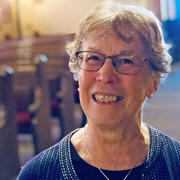
Rosemarie Smurzynski, MTS '80, delivered the following remarks at Morning Prayers in Harvard's Memorial Church on March 11, 2019.
♦♦♦
At 10, I read books on Greek Myths. I searched the sky to pick out the mythic gods outlined among the stars. All I could find was Orion’s belt. It was enough! It was inspiring to see.
At 16, I petitioned the chair of the science department at my high school to let me take astronomy in my senior year. He said “No.” He wanted me in his physics class. Five years later he told my sister why. I was a gifted science student and astronomy was a subject for the less gifted. HMMM! I left high school that winter, entered college and studied art, poetry, literature, government, and teaching.
In a poetry class I came across Robert Frost’s poem "Choose Something Like a Star." I said yes, except that in the 60s, one didn’t say “yes” that way. The poem affirmed my desire to know the stars, the how and why of them, and who I was because they were.
(From "Choose Something Like a Star")
O Star (the fairest one in sight),
We grant your loftiness the right
To some obscurity of cloud….
But to be wholly taciturn
In your reserve is not allowed.
Say something to us we can learn
By heart and when alone repeat.
Say something! And it says "I burn."
But say with what degree of heat.
Talk Fahrenheit, talk Centigrade.
Use language we can comprehend.
Once, on an island off the coast of New Hampshire, I got to look through a homemade telescope an amateur astronomer had brought to the island. The sky was very dark and overwhelming. There was Saturn with its rings looking like a sombrero in the sky. The Milky Way above made me feel tiny and exalted at the same time. And when I spotted the Pole Star I began to sing Follow the Drinking Gourd. It was a religious conference, after all.
By my mid-thirties I entered Harvard Divinity School, and took a side trip to make sense of Creation and what it demanded of me. I studied texts written by the holy ones of the world.
I retired and became a docent at Mount Auburn Cemetery where I now narrate lives of those who lived before me who were curious, imaginative, inquisitive, and inspiring, and who changed the world. There I found Williamina Fleming, 1867-1911, an astronomer, a woman astronomer!
Williamina was at the Harvard Observatory in the late 1800s. She was one of Edward Pickering’s women chosen to peruse glass plate photographs that male astronomers had taken of the night sky the night before. Every morning these images awaited her eye. I wonder: Did she genuflect when she saw them? Williamina had no formal education. She was picked for her brilliance and patience and powers of observation. She, along with others, uncovered the universe’s secrets. She found variable stars—they circle around each other changing the light we see from them here on earth—she found 300 of them—and white dwarfs and the Horse Head nebular. Her monument at the cemetery is a simple slab: name, date of birth and death. And one word across the middle: ASTRONOMER. How I wish I had known her in 1958! But then, my path might have been different and this one has been just fine. She forever changed our understanding of the stars, their distance, their composition, and our place in the universe.
To sweep the skies is to enter the realms of AWE, WONDER, MYSTERY, and POETRY.
We are these days in Lent, a time and a place to ponder what and how and who we are. Astronomy is but one entry point in the journey.
(From "Choose Something Like a Star")
It gives us strangely little aid,
But does tell something in the end.
And steadfast as Keats' Eremite,
Not even stooping from its sphere,
It asks a little of us here.
It ask of us a little height,
So when at times the mob is swayed
To carry praise or blame too far,
We may choose something like a star
To stay our minds on and be staid.
Amen.
